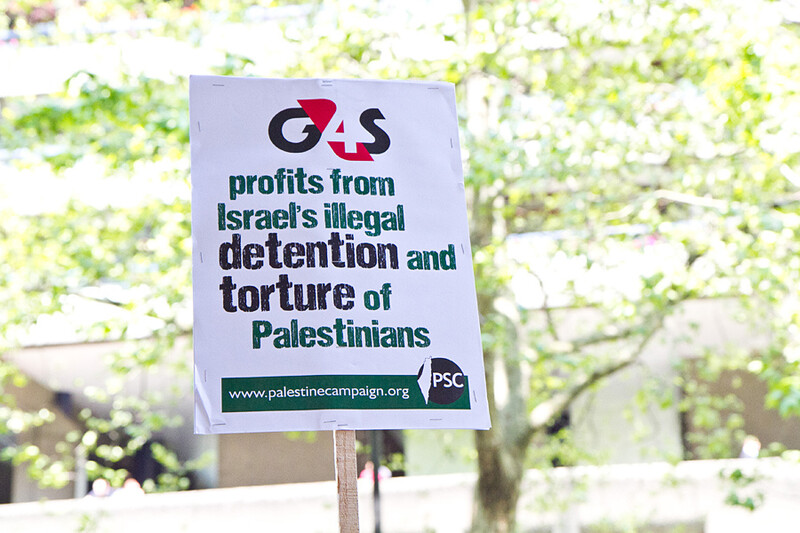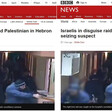Rights and Accountability 11 June 2014

Palestinians are tortured in prisons equipped by G4S. (Aimee Valinksi/Palestine Solidarity Campaign)
In an attempt to justify its work servicing Israeli prisons and checkpoints, G4S has released what it calls an “independent review,” absolving the company of complicity in war crimes committed by Israel.
G4S’s desperation to shore up its failing reputation in the wake of boycott, divestment and sanctions campaign (BDS) successes against the company across Europe, South Africa and the US is evident, not just from the content of the report, but also in the choice of authors.
The report, “Human Rights Review of G4S Israel: Human Rights Report and Legal Opinion,” is co-authored by two academics who both have a strong and visible pro-Israel stance.
Guglielmo Verdirame, who wrote the legal section of the report, is professor of international law at King’s College, London.
In November 2012, as Israel was coming to the end of its eight day assault on Gaza, Verdirame wrote an article for BBC Online in which he defends Israel’s vicious, sustained attack on a refugee population in legal terms.
Three weeks earlier, he had presented the same arguments, justifying Israel’s right to “self-defense” against the stateless Palestinians, to a Zionist Federation event titled “Knowledge Seminar for Israel Advocates,” which took place in London.
The seminar was publicized as being “aimed at grass-roots activists … to help fill in any gaps about core knowledge surrounding Israel, in order to help them to be able to advocate for Israel more effectively.”
The core knowledge being provided by Verdirame to pro-Israel activists was on the subject of “the use of force by Israel under international law.” His talk attempted to give legal sanction to Israel’s attacks, not just on Gaza, but against Lebanon, Syria and in the Sinai.
Verdirame was no doubt invited to speak by the Zionist Federation because of his impeccable pro-Israel credentials. In September 2011, he had chaired a UK Lawyers for Israel roundtable discussion on the implications of the Palestinian bid for recognition as a state. On its website, UK Lawyers for Israel states that its aim is to “invoke laws and regulations to support Israel and oppose its enemies.”
Blame and outrage
The report’s other author, no doubt as carefully selected by G4S for the job as Verdirame, is Hugo Slim, a senior research fellow at the Oxford Institute for Ethics, Law and Armed Conflict.
Slim, at the end of Israel’s three week massacre in Gaza which took place during December 2008 and January 2009 and resulted in more than 1,400 Palestinian dead, wrote an opinion piece for the website Open Democracy. In this, the Oxford academic chosen by G4S to write the human rights section of its report, questions the “disproportionate degree of outrage” the suffering of the Palestinians “seems to provoke.”
In September 2013, Slim was writing in outrage himself to his local newspaper, The Oxford Times, and to The Lancashire Telegraph, over advertisements both papers had carried for the charity Medical Aid for Palestinians (MAP).
The letters, both identical, condemn the MAP adverts for using a graphic which transposes Israel’s apartheid wall in the occupied West Bank onto a street in Oxford.
Slim writes: “It is facile and misleading to pretend that checkpoints are as outrageous in Jerusalem as they would be in Oxford. The need for security for Israeli civilians is clear and Israel has the right to protect its citizens from indiscriminate Palestinian attacks.”
He goes on to blame the Palestinians for what he claims is their role in not providing adequate medical care within the West Bank, leading to the need for Palestinians to cross checkpoints and seek medical help elsewhere. Blaming the Palestinians for their own occupation and the desperate consequences of it is a theme Slim takes up in his human rights review for G4S.
Zionist pedigree
The choice of Slim and Verdirame by G4S to author a report on its activities in the West Bank and Israel makes a mockery not only of the report’s conclusions, but also of a company which thinks it can get away with hiring blatantly prejudiced academics to make those conclusions.
The full report has not even been released to the public. However, a selective 16-page summary of it was released online just one day before G4S’s annual general meeting last week.
In concluding that “there is no case against G4S on the grounds of complicity with alleged war crimes committed by Israel,” the G4S-commissioned report ignores the UN Global Compact, to which G4S is a signatory.
The compact requires that business enterprises should “comply with all applicable laws and respect internationally recognized human rights wherever they operate.” It adds that businesses should seek to honor internationally recognized human rights and treat the risk of causing or contributing to gross human rights abuses as a legal compliance issue.
Unsurprisingly, given the Zionist pedigree of its authors, the report claims that G4S’s work — in providing security systems to Israeli prisons where Palestinians, including children, are held without charge or trial, and in providing body scanners at the checkpoints which restrict Palestinian freedom of movement — is actually beneficial to the Palestinians.
For example, Slim writes about the “potentially positive impact of scanning equipment” at the checkpoints. “Scanners,” he says, “reduce the risks to people’s dignity and privacy from invasive personal search.”
Similarly, the provision of closed circuit television and remote locking systems in the Israeli prisons where organizations such as Amnesty International and Unicef have documented torture, lead, according to Slim, to a “de-confliction of prison space” which is “understood to create a safer environment for prisoners.”
Defending settlers
The report does not mention, of course, the death from torture in February 2013 of 33-year-old Palestinian Arafat Jaradat, who was killed in Israel’s Megiddo prison. G4S-installed systems in that prison notably failed to create a “safer environment” for the father of two.
Nevertheless, the G4S report seems to be saying that Palestinians should be grateful for the company’s role in their imprisonment and for their daily humiliation at checkpoints.
The report becomes even more farcical when it gives the “good reasons why engagement and association with the government of Israel is ethical for G4S.”
These reasons are contained in a section headed “Palestinian Responsibility for Human Rights Risks.”
In this section, Slim, true to previous form, demands that the world recognizes that the Palestinians — dispossessed, occupied and oppressed — are to blame, perhaps more than Israel, for their situation.
He writes: “Many of G4S’s critics overlook the high level of Palestinian responsibility for the conflict and its security dynamics … Israeli systems of detention and movement restrictions … may be imperfect but they are not inherently wrong and they arise partly in response to Palestinian actions.”
The report then goes on to defend G4S’s work in the illegal Israeli settlements, where the company provides security for supermarkets, post offices, kindergartens and police stations.
Having dismissed the human rights of Palestinians, Slim writes: “A good case can be made that G4S equipment is being responsibly used to protect Israeli settlers who also have human rights as individuals, and rights to protection as civilians in an armed conflict.”
Far from credible
For a human rights review, Slim’s report is overtly political. He even brings in the Zionist’s favorite cry of “delegitimization,” writing that the campaign against G4S and other companies is a “key part of a wider strategy by the Palestinian solidarity movement to delegitimize the State of Israel.”
And yet, despite the known pro-Israel biases of the authors and the ridiculous prejudices contained in the report, this review was presented to G4S shareholders as a credible and independent review of the firm’s work in Israel and the occupied West Bank.
Throughout the annual general meeting, G4S chief executive, Ashley Almanza, and chairperson, John Connolly, referred to the report and its two authors as “respectable,” “independent” and “credible.”
By doing so, they undermined still further the credibility of their own company.
In one extraordinary exchange with a campaigner who, like other campaigners at the meeting, had bought a share in G4S in order to attend, Connolly appeared to claim that the legal opinion contained in the G4S report carried more validity than rulings by the International Court of Justice (ICJ).
The board was told by the campaigner: “According to the ICJ, the wall is illegal and therefore the provision of services to it is a breach of international law.”
To which Connolly replied: “We have taken professional legal advice which is contained in our report, and that contradicts your analysis. The report hasn’t found G4S’s involvement in any breaches of human rights.”
G4S on the ropes
The scale of G4S’s denial, and its contempt for international law and Palestinian human rights, is breathtaking. But its presentation of this report, and its naïve expectation that the report will be taken seriously, is indicative of the extent to which the company is on the ropes over its Israeli contracts.
Just three days before the annual general meeting, the Organization for Economic Co-operation and Development announced that it would be investigating G4S for possible breaches of Palestinian human rights as a result of its Israeli prison contracts.
This was followed by a declaration from the Bill and Melinda Gates Foundation that it was liquidating its entire stake in G4S.
The G4S board faced a grilling at its annual general meeting from campaigners, including representatives of the Palestine Solidarity Campaign, the Stop G4S coalition and War on Want.
And while G4S continues to work with and for the Israeli occupation, these campaigners will continue to pile on the pressure. No amount of phony reports will stop that.
Tags
- G4S
- Palestine Solidarity Campaign
- Stop G4S coalition
- War on Want
- Ashley Almanza
- John Connolly
- Bill and Melinda Gates Foundation
- International Court of Justice
- Guglielmo Verdirame
- Hugo Slim
- Arafat Jaradat
- UNICEF
- Megiddo prison
- UN Global Compact
- Medical Aid for Palestinians
- Oxford Times
- Lancashire Telegraph
- Oxford Institute for Ethics, Law and Armed Conflict
- Open Democracy
- Zionist Federation
- King's College London
- Gaza
- West Bank
- Lebanon
- Syria
- Sinai
- OECD
- checkpoints
- torture
- Palestinian political prisoners
- Amnesty International






Comments
The 2011 'review'
Permalink Sonja replied on
In 2011 G4S circulated another 'review', for people and institutions questioning its business in Israel and West bank, boldly stating that it had ended its activities in the West Bank.
purchased testimony
Permalink SteveLaudig replied on
is as true and credible and authentic as purchased sex. And the vendors of it are called by the same name.